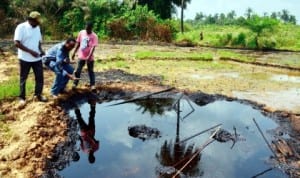
Environmentalists inspecting oil spill impacted site at Ikarama, Yenagoa Local Government Area of Bayelsa State recently.
A one day interactive
meeting for stakeholders on oil palm production has been held in Calabar, the Cross River State capital.
Speaking at the interactive session on ‘Improving Oil Palm Production Business in Cross River State’ organised by the Nigerian Export Promotion Council, the Director of Administration, Dr. Francis Adie, who stood in for the Commissioner for Agriculture and Natural Resources, Mr. James Aniyom, stated that governments around the world are incorporating the use of palm oil into programmes targeted at wiping out deficiency diseases.
The commissioner asserted that palm oil is rich in vitamins, antioxidants and other phyto-nutients, noting that Nigeria Export Promotion Council’s decision to hold this stakeholders interactive meeting on palm oil production for export is pertinent a way forward in boosting the economy.
He explained that it was heartwarming to realise that Calabar was chosen for the event, adding that the Nigerian Airport Authority was also striving at designating the Margaret Ekpo International Airport an ‘Agricultural Terminal’ for the exportation of agricultural produce.
Earlier, Barrister George Enyiekpon, the Zonal Controller of Nigeria Export Promotion Council for Akwa Ibom and Cross River State, disclosed that their motive in the said forum was to promote the exportation of oil palm produce.
He explained that it was their statutory responsibility to promote non-petroleum oil export in Nigeria, with the aim of improving and diversifying the Nigerian Economy base.
He noted that politics of ‘oil’ had created international pressure, adding that ‘no nation could concentrate solely on one source of economy’.
The Zonal Controller of Nigeria Export Promotion Council further stated that an exportation benchmark had been encouraged for export expansion grant of 10-30% of all value export established for states inclined to receive them.
He noted that states concerned were to give information on the statistics of their exportation activities to the ‘Council’ alongside with their accounts, in order to know whether they are actually earning dividends from their agricultural resources.
